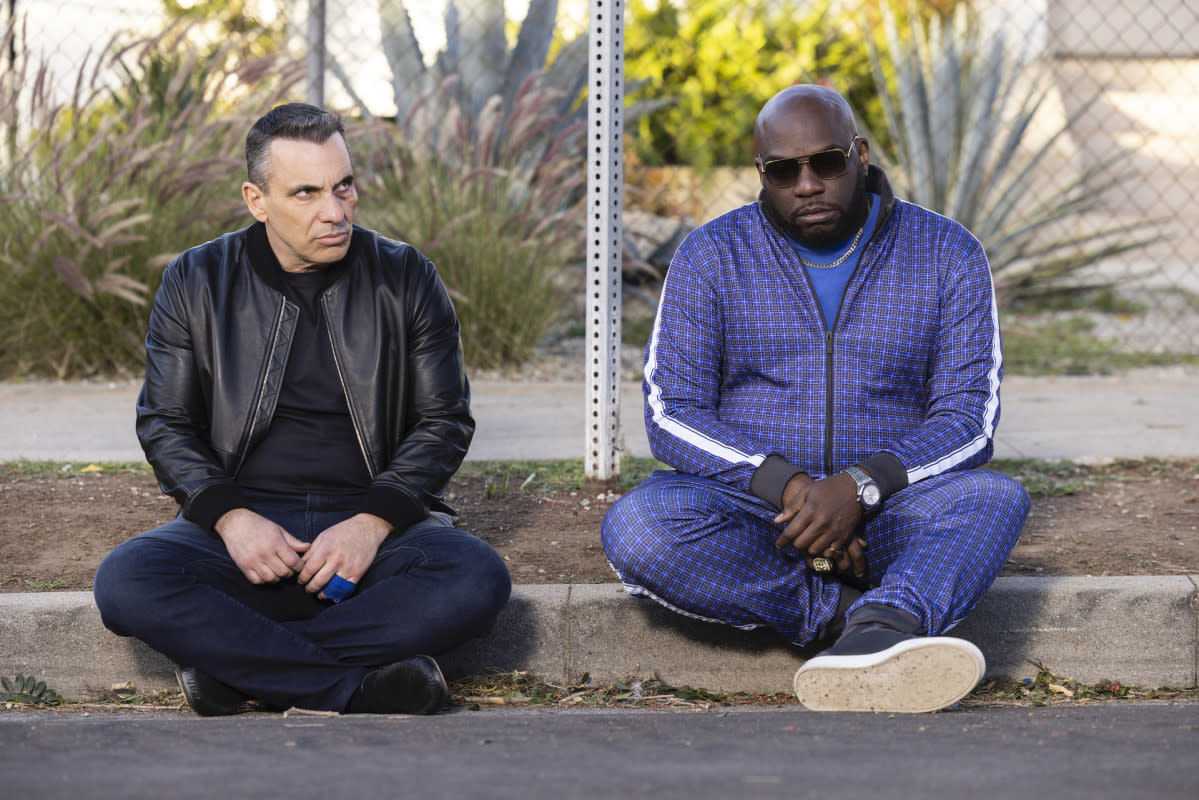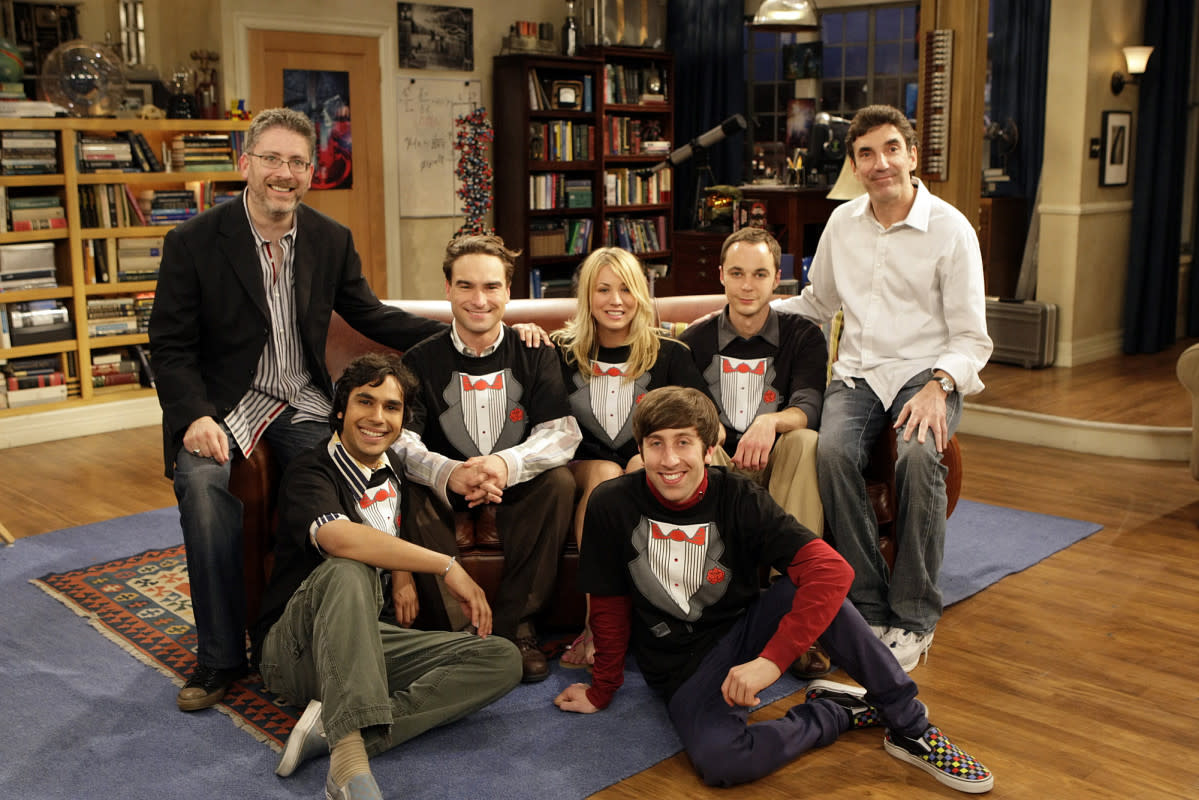How Chuck Lorre Put Aside a Decade-Long Feud with Charlie Sheen

Chuck Lorre Interview
Chuck Lorre, the Emmy-nominated creator of The Big Bang Theory, Two and a Half Men and The Kominsky Method, 71, is turning his talent to a darkly funny new eight-episode comedy, Bookie (Nov. 30 on Max). Starring Sebastian Maniscalco (The Irishman) as veteran Los Angeles bookie Danny, the series follows his trials and tribulations as the potential legalization of sports gambling in California threatens to upend his business for good. Full of relatable mishaps, Bookie chronicles Danny’s journey to adapt to an ever-changing world as he attempts to charm and con his way to the top.
Parade sat down with Lorre to discuss his latest show, his prolific career and what might come next.
What came first? The idea for a sports bookie or the desire to work with Sebastian Maniscalco?
I did a deep dive into Sebastian's work and it’s extraordinary. He’s a master of the craft. And then I saw a small scene he did in The Irishman, where he played the Crazy Joe Gallo in the scene with Robert De Niro and Joe Pesci, and it was really an entirely different aspect of Sebastian that I didn't anticipate. He's got real acting chops.

Max
So, you had the idea of working with Sebastian. How did you get to a sports bookie?
I'd always wanted to do something in that gray zone of criminality. I've been safe as milk for a long time, and that's fine, but I've always wondered if I could bring comedy into an area that's a little bit more dangerous, a little bit off the grid. I presented this thought to Nick Bakay, who has always been a great writer/producer on Mom and Young Sheldon. Nick’s background includes sports gambling. He was a commentator for ESPN for many years as an expert on betting on sports. He proposed, “What about the world of bookmaking?” That was it. Sold, because I didn't want to do a series about violent characters. That's been done and done very well with shows like Barry. I didn't know how to extend comedy into an arena where people are genuinely psychotic. We pitched the idea to Sebastian and he was all for it, so we started writing.
Charlie Sheen has a guest starring role in this. The two of you hadn’t spoken in a decade, how did that casting come about?
We wrote the first draft, and we had the idea that since our bookmaker was working in the Los Angeles area, he might have some celebrity clients. It made sense. It was a to-be-determined situation as to who that celebrity client might be. One night, it became crystal clear to me that the perfect person to cast playing himself as a—let’s call it what it is—degenerate gambler was Charlie. Because back in the day when things were going well for Two and a Half Men, he would tell these incredible stories about bets he made on NFL games. So, I called Nick one night and said, “It should be Charlie,” and then the question was: Where am I with Charlie after all the craziness that we went through? I felt good about it. I felt like it was in the past. It was ancient history. I had come to a place of being really at ease with the whole backstory of our relationship, so I called Charlie and I said, “Do you want to do this?” And he was gracious and grateful and excited and totally game to make fun of his persona. He killed it. As Nick pointed out, it was like a clinic in how to do comedic acting and keep it grounded and real. It was a remarkable performance.
Related: Charlie Sheen Sues 'Two and a Half Men' for $100 Million
This series is about how sports betting and gambling is an issue that affects many families, as does Mom with substance abuse, and Mike & Molly with weight issues. Why base your comedy in these arenas that might make it difficult for people to watch?
I hope that first scene made it clear that we aren't going to sugarcoat the devastating effects that this can have on a family. We aren’t making light of it. This man had ruined his family and was being thrown out of the home. That's the first scene of the show and yet he continues to gamble like an addict would continue to indulge in drugs or alcohol. This behavior is very much an addiction. So, by jumping into these murky pools of morality, it's a great way to explore human beings and to get some insight into how people rationalize poor behavior. How did they get there? How did they stay there? What are the repercussions of being in that gray zone?
One of the things we came up with is it's a continual hustle. It's hard work to be a criminal. What I didn’t anticipate when I was writing, is that even in victory, it's difficult. When they're sitting on all that cash, what do you do with all that cash in an electronic world? It's a dilemma.
You work with all these great talents; you've had hit series after hit series. What is it like when these actors say your words and hit the character the way that you want it to be?
It’s really gratifying. It's fun to be right. It’s very preferable to being wrong. But one of the things I've learned over the years as a result of working in front of live audiences—for 35 years all the work that I've done has been in front of a live studio audience—they tell you immediately when you're wrong. Their silence screams, “Wrong!” You make the joke here in Burbank, and if a joke fails to work with a live audience, the silence is such that you can hear the 134 freeway in the distance.
The greatest teacher in the world was 30-some-odd years working in front of an audience. The audience doesn't care what I think is funny, they respond to what they think is funny. When you work without an audience in the genre of single-camera film, which is what Bookie is, I have to rely on that audience still being in my head. I ask myself, Am I kidding myself or is this really funny? Is this really the moment we're going for here? Or is it lazy? Is this a cheat? So, the live studio audience is a big part of this even though they’re not there.

Getty Images
The Big Bang Theory changed people's lives. You made it cool to be a nerd. The show changed the culture. At what point did you realize the impact that you were having, and then did you feel a responsibility?
I always bristled at the word “nerd.” I thought we were writing about brilliant minds without the psychotic nature of someone who's incapable of operating in this world. These were brilliant characters and what attracted me to The Big Bang characters was brilliance doesn't necessarily equate to happiness. It doesn't equate to making connections with other people, either platonic friendships or romantic relationships. Brilliance is brilliance but it doesn't necessarily bring you what you're seeking. What these characters were seeking ultimately, I found out certainly in the act of making the show, is they were looking for community; they were looking for fellowship, and they found it amongst themselves. The world at large may have been hard to deal with and baffling, but one of the things if you watch the show, you notice they eat together all the time. They're always in the living room and they would eat together and that's a real family, communal activity.
I think it's really attractive. It's what people want, and they had that. They had each other. They may not have understood how to get along in this world, but they had each other and that was the secret sauce that made the show special for me.
I love that in the ending of the series, the most isolated, reclusive, difficult character [Sheldon] in the show when he's winning the Nobel Prize says, “I couldn't have done it without my friends.” He acknowledges at the end of the series that it was a communal activity that brought him to a Nobel Prize. The most selfish character in the show recognizes the power of community. I just love it.
Related: The Big Bang Theory Photos: Say Goodbye to Sheldon, Leonard and the Gang
With all your success, you founded The Chuck Lorre Family Foundation to give back.
The scholarship began when we started seeing articles early on in the run of The Big Bang Theory that kids here and in England were starting to pursue STEM fields really young because The Big Bang Theory made it look cool. So, we were actually changing the trajectory of young lives by doing this thing, which was just intended to make people laugh. The show presented these brilliant guys as having a communal walk through life. They weren't walking alone. I thought, Well, wouldn’t it be cool to actually help kids pursue that? I wanted to do it locally. I wanted to do it in a way that I could participate. So, with the help of David Saltzberg, who was a consultant on the show and a professor of physics at UCLA, we arranged for a scholarship at UCLA, which is still going strong.
Then I got involved in health care as well, the Venice Family Clinic, because it was meaningful to me. There was a time in my life when I had no money, I had no insurance and I was very, very sick and I didn’t know where to go. I didn't know about free clinics. I was really lost and so helping with the free clinic felt like a natural way for me to participate.
Do you ever think of retiring or is working on a streaming comedy, where it's six to eight episodes, is that like retirement after doing 22 a year for a network series?
You work just as hard. I don't really know what constitutes success in the streaming universe. I just try to focus on the goal that's been my goal for a really long time, which is comedy is supposed to make you laugh. When I was a kid watching stand-up comics or Laurel and Hardy, Abbott and Costello, The Three Stooges, or Get Smart, I was watching and I was laughing and I wanted to do that. I thought, That's a good way to spend your life, trying to make people laugh.
Next, From 'I Love Lucy' to 'Schitt's Creek,' These Are the 30 Best Sitcoms of All Time
